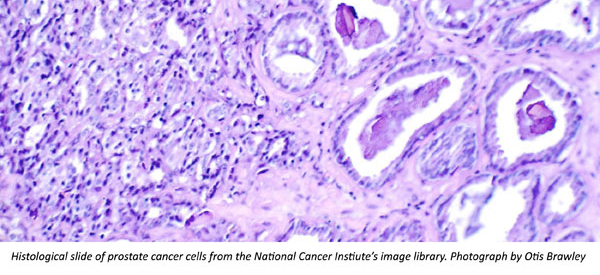Latest News
Research
New technology improves detection of prostate cancer cells in a patient’s bloodstream
Jun 25, 2012

VCU Massey Cancer Center continues to test new technology by ApoCell, Inc. that can detect circulating tumor cells (CTC) in a patient’s bloodstream. In April, Massey reported on a pilot study of the device in liver cancer patients, and now a new study demonstrates that the device can effectively collect CTCs in patients with metastatic prostate cancer.
.jpg) The study led by Andrew Poklepovic, M.D., an oncologist at VCU Massey in the Division of Hematology, Oncology and Palliative Care and an assistant professor of internal medicine at VCU School of Medicine, directly compared ApoCell, Inc.’s ApoStream dielectrophoretic cell separation system to the current standard CTC detection platform. ApoStream detected CTCs in all eight patients and collected significantly more CTCs than the other leading CTC detection system, which detected CTCs in just 80 percent of the patients.
The study led by Andrew Poklepovic, M.D., an oncologist at VCU Massey in the Division of Hematology, Oncology and Palliative Care and an assistant professor of internal medicine at VCU School of Medicine, directly compared ApoCell, Inc.’s ApoStream dielectrophoretic cell separation system to the current standard CTC detection platform. ApoStream detected CTCs in all eight patients and collected significantly more CTCs than the other leading CTC detection system, which detected CTCs in just 80 percent of the patients.
“There is a huge increase in the amount of data we are able to collect on the circulating tumor cells with the ApoCell device,” says Poklepovic. “We plan to continue testing ApoStream on various forms of cancer. In addition, we hope to utilize the device in future clinical trials to test for biological changes in the tumor cells caused by the therapies.”
VCU Massey is already using the device in one clinical trial for prostate cancer that combines the drug lapatinib with radiation therapy for patients with bone metastases. In this study, the researchers are examining the cancer cells collected by ApoStream for changes induced by radiation that may lead to further proliferation of the cancer. This type of analysis would not be possible with other CTC capture techniques because in those devices the cancer cells of interest are not captured effectively.
“This technology could potentially eliminate the need for painful biopsies, be used as a screening tool and speed up the development of new drugs,” says Poklepovic. “We are excited to be one of the first cancer centers currently utilizing this technology and eventually we hope to expand the use of the device for a wider variety of cancers and also in earlier stages of the disease.”
This pilot study was supported, in part, with funding from VCU Massey Cancer Center’s NIH-NCI Cancer Center Support Grant P30 CA016059.
Written by: Alaina Schneider
Related News
Research
“We’re aiming for a cure.” Massey and VIMM researchers achieve potential breakthrough in brain cancer treatmentJun 24, 2025
Research
Massey researchers discover new genetic target that could shape the future of liver cancer treatmentJun 23, 2025
Research
Virginia health leaders emphasize community impact, collaboration at Virginia Public Health Summit on CancerJun 10, 2025

Get access to new, innovative care
Treatments in clinical trials may be more effective or have fewer side effects than the treatments that are currently available. With more than 200 studies for multiple types of cancers and cancer prevention, Massey supports a wide array of clinical trials.

Find a provider
Massey supports hundreds of top cancer specialists serving the needs of our patients. Massey’s medical team provides a wealth of expertise in cancer diagnosis, treatment, prevention and symptom management.
